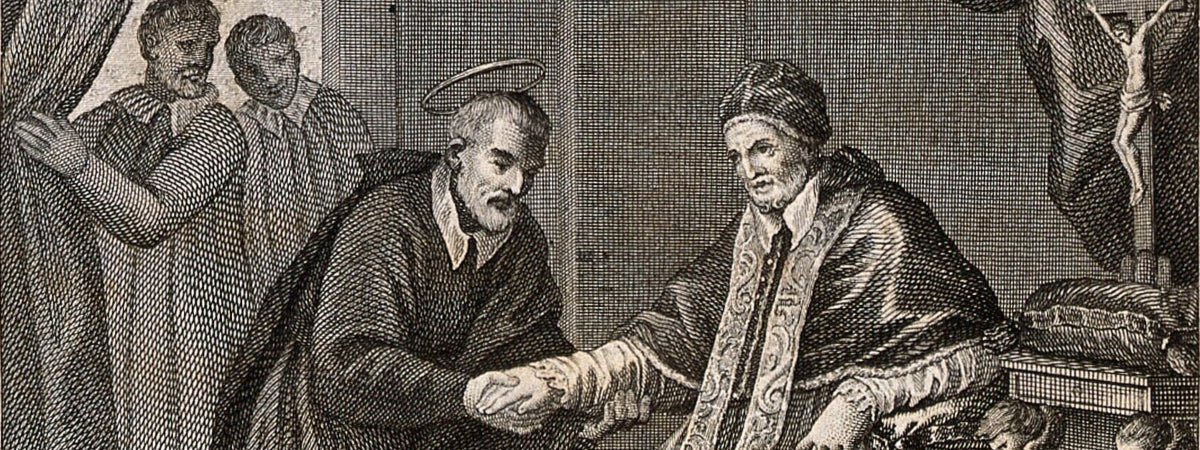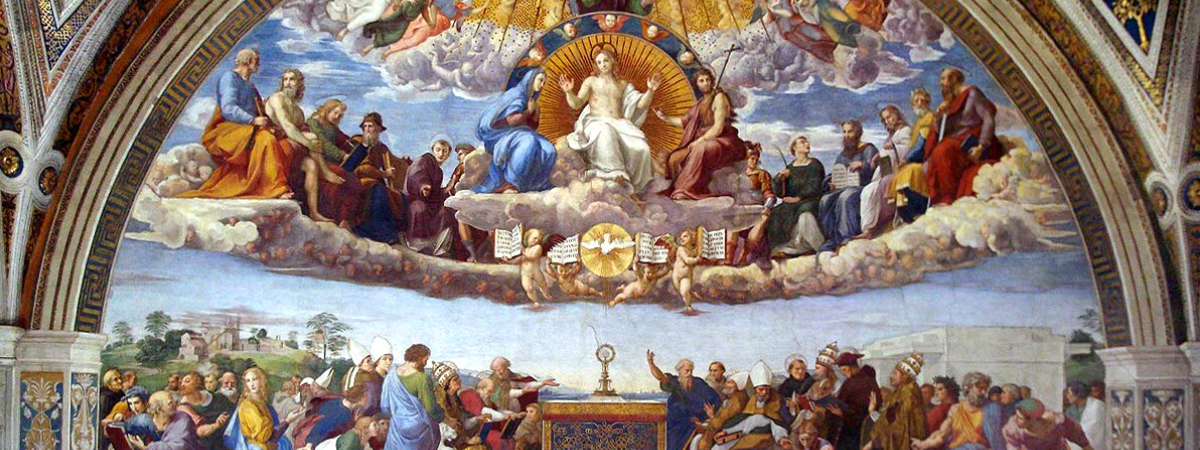Who doesn't want friends? We all do, right?
And as Catholics, we have a saint who can guide us in developing and maintaining lasting friendships and in rooting them in joy.
That saint is Philip Neri.
Friend of Friends: St. Philip Neri
There is a popular saying: “To convert somebody, go and take them by the hand, and guide them.”
That is what St. Philip Neri did so well. He used the virtue of affability and a spirit of joyfulness to guide people to a holier life.
“In dealing with our neighbour,” he said, “we must assume as much pleasantness of manner as we can, and by this affability will win him to the way of virtue.”
Aristotle believed that friendships are one of the best things life has to offer, saying: “For without friends no one would choose to live, though he had all other goods.”
St. Thomas Aquinas also had a high view of friendship. He said: "Friendship is the source of the greatest pleasures, and without friends even the most agreeable pursuits become tedious."
Affability is the key virtue that helps us make friends. What is affability? It's the habit that regulates our outward manners so that we act in a friendly, courteous way towards the people with whom we come in contact.
[[43907, sterling-silver-st-philip-neri-pendant-w-chain]]
In order to lead a flourishing and happy life as human beings we need love and fellowship from one another; this is rooted in friendship, and friendship is rooted in the virtue of affability.
In the words of St. Basil, “He who sows courtesy reaps friendship, and he who plants kindness gathers love.”
St. Philip Neri was a 16th-century figure (1515-1595) who became a mystic and missionary, a priest and a prophet, a founder of the Oratory and a healer of souls. He became well-known in and around Rome, where he lived, which at the time was deeply in need of reform and spiritual renewal. In learning about the life of Philip Neri we can discover how his affable manner—strengthened by firm and solid faith—led him to become the patron saint of joy and friendship.

The Life of St. Philip Neri
The following is an excerpt from the life of St. Philip Neri from the Good Catholic series Heroic Virtue.
St. Philip Neri (1515 – 1595) was born into a noble working family in Florence, Italy. He was a dutiful child with a cheerful temperament and pleasant manners, making him popular with all who knew him. His friends nicknamed him “the good Philip."
From an early age Philip was attracted to the things of God. He also demonstrated an uncommon maturity for his age.
“There was something masculine about his boyish devotions, which it is difficult to explain. He was not addicted to those exhibitions of childish piety [...] He was fond of really praying, reciting psalms, and above all, of hearing the word of God.”
As he grew older he greatly desired to increase in virtue, and sought spiritual instruction from the local Dominican convent.
When Philip was a teenager his father sent him to become an apprentice with his uncle, who was a wealthy businessman. Philip excelled in this role and was expected to inherit his uncle’s business and fortune. However, after two years Philip knew that this was not the future God intended for him. He carefully discerned that God was calling him to a different life. He bid his uncle farewell, and set off for Rome.
He had no clear indication of what would happen next. He simply traveled like a poor pilgrim to the Eternal City trusting in God’s Providence. Soon after arriving, he met a fellow Florentine gentleman who provided him with room and board in exchange for tutoring his two small sons. Philip educated the boys and trained them in virtue, perhaps without realizing this was a glimpse of the future God had planned for him. He realized he needed an education in order to better understand the spiritual life, so he enrolled in philosophy and theology classes. His dutifulness and cheerfulness ensured his success as a student, and he was considered one of the most distinguished and spiritually edifying scholars in Rome.
Philip also began visiting the city’s hospitals and instructing the poor in the faith. His friendliness and helpfulness was a consolation for many. As time went on, his desire to serve others with spiritual and corporal works of mercy began to increase. In fact, his future was not to be a scholar but to live among the poor and simple people of Rome.
He devoted himself to a life of asceticism, carving out a unique path as something of a wandering hermit. He began the daily habit of visiting the seven pilgrim churches of Rome each day, as well as venerating the tombs of the saints in the ancient catacombs.
Philip’s love for Our Lord greatly increased during these years. While at prayer he experienced profound emotions that caused him to sigh and weep aloud.

St. Philip and The Holy Spirit
At the age of twenty-nine these overpowering torrents of grace left a physical effect in his body. As he was praying for an increase in the gifts of the Holy Spirit in preparation for the feast of Pentecost,
“While he was with the greatest earnestness asking of the Holy Ghost His gifts, there appeared to him a globe of fire, which entered into his mouth and lodged in his breast; ...he was suddenly surprised with such a fire of love...and putting his hand to his bosom, he felt by the side of his heart, a swelling about as big as a man's fist, but neither then nor afterwards was it attended with the slightest pain or wound.”
After his death, when his body was examined, it was found that Philip’s heart had expanded so greatly with the love of God that two of his ribs had been broken and curved outwards. This mystical event was the defining moment of his life. From then on, Philip experienced strong heart palpitations “whenever he performed any spiritual action.”
After receiving this special grace of the Holy Spirit, Philip became inflamed with even greater love for God and neighbor. He devoted himself to a new and apostolic way of life committed to the salvation of souls. It was his fire of holy charity, combined with his ability to befriend others, that transformed Philip into “The Apostle of Rome.”
He walked through the streets and neighborhoods of Rome using his characteristic affability to inspire the strangers he met to a greater love for God. Amongst others, he exhorted the young men in the warehouses to serve God, saying, “Eh, my brothers, when shall we begin to do good?" and thus with his natural sweetness, and wonderfully attractive manner, he gradually gained such influence over them, as to win them to the service of God.
In order to win the friendship of others, Philip made sure to never appear singular or odd in any way. For example, although he was accustomed to fasting in private, when dining with company he ate whatever was put before him, and in general avoided appearing special. He was affable towards everyone. As a result, he became very popular in Rome, and many people sought him out for advice or spiritual guidance. He would often tell others, “Cheerfulness strengthens the heart and makes us persevere in a good life; wherefore the servant of God ought always to be in good spirits.”
Many men were attracted to Philip’s personality and his unique manner of life, so he gathered them into a confraternity. He united fifteen of his devout companions to regularly meet together for holy fellowship, religious exercises, and to be instructed by him through spiritual conferences and sermons.
This community continued to grow and became a gathering place for pilgrims who visited Rome. Philip would receive the pilgrims and provide them with food, assistance, and lodging during their stay. It expanded into a rehabilitation house for the sick who had been discharged from the hospitals. This organization—the Confraternity of the Most Holy Trinity of Pilgrims and Convalescents—soon became famous throughout Rome. Many people of high position, even popes, volunteered to serve in this institution. The spiritual fruit of this confraternity was boundless; lukewarm Catholics became devout, and non-Catholics were baptized into the Church.
Philip did all of this as a layman. However, his confessor advised him that he would better serve the souls he drew to himself if he were also able to provide them with the sacraments. After overcoming his reluctance, and in obedience to his confessor, Philip was ordained to holy orders at the late age of thirty-six.
Philip was very concerned that his young male penitents would relapse into a dissolute life, so he befriended many of them to keep them close to himself. He adopted them as his “spiritual children” and invited them in small groups to his residence in order to continue guiding them to a holier way of life. They would discourse on spiritual matters, and then “go to some open place for recreation.”
St. Philip and The Oratory
This gathering grew tremendously and moved to a bigger location inside a church. It attracted “men of opposite tastes, of different talents, and of varying dispositions” who came together for friendship and the pursuit of holiness in common. Philip simply called it “The Oratory.” Its success was so great, and its spiritual fruit so abundant, that Philip founded it with papal approval as a congregation of apostolic priests.
When Philip was first led to Rome by the Holy Spirit, the city was characterized by indifference, luxury, pride, and corruption. This condition was widespread even among the clergy. Churches were neglected, flocks were abandoned, and the loss of faith was widespread. As a result, there was widespread laxity among the laity, and Catholics received the sacraments infrequently. But St. Philip revived the faith of the people of Rome with his lively and friendly manner, and encouraged them to frequent confession and Holy Communion. Penitents flocked to him, and he spent countless hours in the confessional, always making himself available at a moment’s notice for this duty. All of Rome seemed to come alive with a renewed zeal for the Catholic faith his influence.
What made all of this possible was Philip’s guiding principle to exhibit a friendly cheerfulness toward everyone he met. “The true way to advance in holy virtues,” he said “is to persevere in a holy cheerfulness.”
[End of Heroic Virtue Excerpt]
How Can We Be Like St. Philip Neri?
By inspiring his spiritual children with his own contagious affability, St. Philip Neri was more quickly able to help souls reach the heights of sanctity that God intended for them, and from his example we can learn a lot.
The life of St. Philip Neri gives us a beautiful illustration of the attractive power of kindness and courtesy. We can think of ways to apply this virtue to the people we come into contact with in the regular comings and goings of our daily life: our visits to the grocery store, school, church, sporting events, and even in our own homes.
In fact, it's in our everyday life that we are called to be a light to others. A simple smile or a kind word to someone when we don't feel like it or a spiritual encouragement to someone we know is struggling can go a long way to build up our relationships with those God has placed in our life.
[[st-philip-neri-8mm-hematite-rosary, 43929]]
Are there other ways we can go out of our way to befriend others, as St. Philip did? Perhaps, like him, we can volunteer our time. There are many places—hospitals or nursing homes or in our own parishes—where people might be suffering, and we can lend our time for no other purpose than to share a cheerful face or a kind word.
Or perhaps we can go a step further to imitate St. Philip by organizing evenings of spiritual exercises and public devotions (for example, processions or pilgrimages to celebrate special feast days) and invite people to come along—especially those who are most in need of special graces or holy influences. Or we might simply gather with a few friends over coffee for some spiritual conversation and encouragement.
Life is difficult and having friends on this earthly pilgrimage is truly a God-send. Let us seek the prayers of St. Philip Neri and ask for his intercession in developing and maintaining lasting friendships and in striving to become more courteous and encouraging to those around us .
Prayer to St. Philip of Neri
St. Philip, you converted countless souls to a greater love for God
by befriending them and treating them with courtesy and kindness.
Please pray for us to grow in the virtue of affability and joyfulness,
which shone through all your words and actions,so that we, too,
may win many souls for Christ.
Amen.























